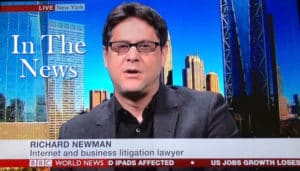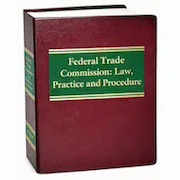Ad Law Insights - Legal and Regulatory Updates
FTC + state attorneys general digital marketing compliance, investigation + enforcement advocacy by FTC lawyer to Internet business community
This website is brought to you by Hinch Newman LLP and FTCDefenseLawyer.com.



On June 13, 2026, the Federal Trade Commission requested a federal court to hold the operators of a payment processing operation in contempt for alleged systematic violations of a 2015 order with the agency over allegations they illegally processed credit card payments. In a motion filed in federal court, the FTC alleged that the processor, along with its operators, CEO and Chief Technology and Security Officer, flouted their obligations under a 2015 order. The FTC asked the court to impose at least $52.9 million in compensatory relief for consumers, modify the 2015 order to permanently ban the individuals from the payment processing business, and appoint a receiver to ensure that the company and its operators comply with the 2015 order’s requirements.
The FTC alleged that the company violated numerous provisions of the 2015 order while processing for companies expressly prohibited by the order. This includes a group of merchants that have separately been indicted for crimes related to this processing, according to the FTC.
“[The company] and its operators flagrantly violated an FTC order requiring reasonable steps to prevent and detect fraud,” said FTC lawyer Christopher Mufarrige, Director of the FTC’s Bureau of Consumer Protection. “We will not hesitate to hold accountable companies that ignore red flags and distort the honest functioning of the U.S. payment system.”
The FTC alleges that the company and its operators alleged violations include:
- Processing hundreds of millions of dollars in payments for at least three clients on Mastercard’s Member Alert To Control High (MATCH) list,
On January 13, 2026, the Federal Trade Commission announced that it sued a specialized advice website operator and its CEO, alleging the online service deceives people seeking expert advice into enrolling in a monthly recurring subscription without obtaining consumers’ affirmative consent.
The FTC alleges that the company and its founder and CEO falsely claim that consumers can “join” the service and get access to expert advice for as little as $1 or $5. But when consumers sign up to use the service, the company actually enrolls them in a recurring monthly subscription costing anywhere from $28 to $125 and immediately charges them this fee, as well as the $1 or $5 join fee, according to the FTC. The complaint alleges that the company continues to charge the subscription fee every month until the consumer cancels their subscription.
“[The company’s] misleading pricing tactics obscured the true price of its services, preventing consumers from making an informed choice on whether [the company’s] services were worth it to them,” said FTC lawyer Christopher Mufarrige, Director of the FTC’s Bureau of Consumer Protection. “The FTC is focused on ensuring that online sellers transparently price their services.”
While the company provides limited information about the required monthly subscription on its website, it does not disclose the terms clearly and conspicuously as required by the Restore Online Shoppers’ Confidence Act (ROSCA), according to the complaint. As a result, consumers have provided their credit card information to the company without affirmatively consenting to enroll in an ongoing monthly subscription and pay the monthly fee,
On January 6, 2026, the Federal Trade Commission announced that it has launched a refund claims process for some consumers who were charged for a subscription to the anonymous messaging app NGL without their authorization.
In July 2024, the Federal Trade Commission and Los Angeles District Attorney’s Office alleged that NGL and two of its co-founders engaged in a host of law violations related to their anonymous messaging app, including unfairly marketing the service to children and teens. The agencies charged NGL and its co-founders with sending bogus messages that appeared to come from real people and tricked users into signing up for paid subscriptions to NGL Pro by falsely claiming that doing so would reveal the identity of the senders of messages.
The complaint also alleged that the company encouraged users to purchase a paid version of the app to learn the identity of the people who sent them anonymous messages, however after consumers upgraded they did not actually learn the senders’ identities.
NGL and its co-founders also allegedly failed to obtain consent for recurring charges. The order settling the agencies’ complaint banned the defendants from marketing anonymous messaging apps to kids and teens under 18 and required them to pay $4.5 million to provide refunds to impacted users.
According to an FTC compliance attorney, the FTC is using that money to provide payments to customers who meet the following requirements:
- paid for NGL Pro between January 2022 and July 2024;
On January 6, 2025, the Federal Trade Commission issued its biennial report to Congress on the National Do Not Call (DNC) Registry that illustrates consumers placed more than 258 million telephone numbers on the Federal Do Not Call Registry as of the end of fiscal year 2025, an increase of more than 4.8 million from the previous fiscal year.
According to the Report, the FTC received more than 2.6 million Do Not Call complaints in fiscal year 2025 — an increase from the previous fiscal year — with consumers mostly reporting these violations came via robocalls, as opposed to live telemarketing.
According to FTC attorneys, debt reduction schemes, imposters (calls pretending to be government, business, or family and friends), and medical and prescription inquiries led the list of commonly reported unwanted telemarketing calls in FY 2025, followed by calls related to energy, solar, and utilities, as well as home improvement and cleaning services.
The FTC continues to track how technology affects the DNC Registry and the consumers and telemarketers who access it. For many years, telemarketers have used automated dialing technology to make pre-recorded calls, commonly known as robocalls. Such calls can be made in large numbers with little expense, leading to a significant increase in telemarketing robocalls, including illegal robocalls. According to the Report, the number of consumer complaints about illegal telemarketing robocalls steadily decreased from FY 2017 through FY 2024.
While the number of complaints about robocalls ticked up in FY 2025,
On January 5, 2025, NYC Mayor Zohran Mamdani, joined by Attorney General Letitia James, City Council Member Julie Menin, and DCWP Commissioner Sam Levine, announced that it has signed two executive orders: to combat businesses’ deceptive use of junk fees and crackdown on subscription tricks and traps that that drain money from New Yorkers and make essential goods and services less affordable.
Following the signing, DCWP will begin outreach to businesses to ensure compliance with city law and signal immediate consequences. Contact an experienced New York DCWP (DCA) defense lawyer if you have been contacted by the NY DCWP or the NY Office of the Attorney General relating your billing practices.
“New Yorkers deserve to know exactly what they are paying, how much it will cost, and whether they are signing up for an ongoing charge — before a single dollar leaves their account. Instead, too many people are hit with hidden fees and blindsided by subscription traps they never knowingly agreed to and cannot easily escape,” said Mayor Mamdani. “In the midst of an affordability crisis that is already pushing working New Yorkers out of their city, these deceptive practices put even more strain on household budgets. This executive order restores what should have always been the case: transparency in pricing, accountability for companies, and full compliance with the law.”
“New Yorkers are paying too much for everyday services because of hidden, unexpected junk fees and illegal subscriptions traps.
Topics
Archives
About This Blog and Hinch Newman’s Advertising + Marketing Practice
Hinch Newman LLP’s advertising and marketing practice includes two decades successfully resolving some of the highest-profile Federal Trade Commission (FTC) and state attorneys general digital advertising and telemarketing investigations and enforcement actions. The firm possesses superior knowledge and deep legal advocacy experience in the areas of advertising, marketing, lead generation, promotions, e-commerce, privacy and intellectual property law. It has also been selected to author the Consumer Protection Section of the prestigious American Lawyer Media International Federal Trade Commission: Law, Practice and Procedure Treatise, a comprehensive resource for developments of concern to advertisers, marketers and legal professionals that practice before the Commission. Through these advertising and marketing law updates, Hinch Newman LLP provides commentary, news and analysis on issues and trends concerning developments of interest to digital marketers, including FTC and state attorneys general advertising compliance, civil investigative demands (CIDs), and administrative/ judicial process.
